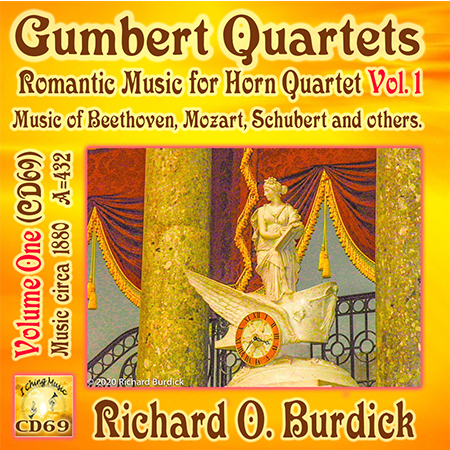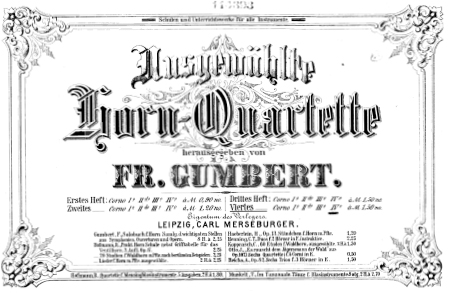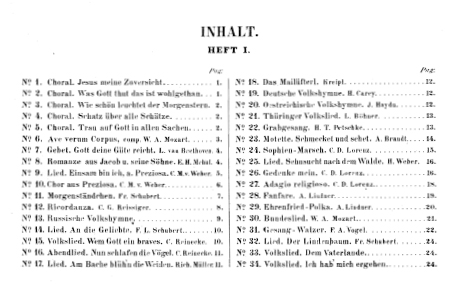

Released: January 29, 2023
Recorded at A = 432 for health and greater beauty
![]()
Hear it on BandCamp
![]()
Author, arranger: Friedrich Adolph Gumpert (27 April 1841, Lichtenau (Thüringen) - 31 December 1906, Leipzig) also known as Gumbert, but Gumpert is correct.
A German horn player and teacher. Gumpert received his early musical education in Jena. From 1860 he was a horn player, first in Bad Nauheim, then (after completing his military service) in Halle. In October 1864, at the behest of Carl Reinecke, he became First Horn in the Gewandhausorchester Leipzig, a position he held until 1899. He was a founder member of the Gewandhaus-Bläserquintett, formed in 1896. Gumpert was Professor of Horn at the Leipzig Conservatory from 1882 until his death. As well as Heinrich Lorbeer, his pupils included Anton Horner, Max Hess and Max Pottag, all three highly influential in the development of horn playing in the USA. His publications (all of which appear, erroneously, under the name 'Gumpert') include twelve volumes of orchestral excerpt books (Orchesterstudien) arranged for horn and other wind instruments, a horn method, this set of four volumes for horn quartet , and many arrangements for horn and piano.
It would have be Gumpert who play first horn for the premiere of Mahler's 1st Symphony.
This set of CD's has quite a few works by formernly famous composers:
Track 8: "I was a Young Man Romance from Jacob and his sons." by E. H. Mehul
Étienne-Nicolas Méhul, (born June 22, 1763, Givet, Ardennes, Fr.—died Oct. 18, 1817, Paris), composer who influenced thedevelopment of French opera and who was one of the principal composers in the late 18th- and early 19th-century style.
In 1782 Méhul produced a cantata at the Concert Spirituel on a text by Jean-Jacques Rousseau. Influenced by Christoph Gluck and Luigi Cherubini, he turned to dramatic music and between 1787 and 1822 composed more than 40 operas, produced mainly at the Opéra-Comique. His first performed opera was Euphrosine et Coradin, ou le tyran corrigé (1790; Euphrosine and Coradin, or the Tyrant Corrected). His most successful works were Le Jeune Henri (1797), Les Deux Aveugles de Tolède (1806; The Two Blind Men of Toledo), Uthal (1806), and Joseph (1807). He also wrote patriotic works, demanding great choral and orchestral resources, to mark festive occasions of the French Revolution, such as the Hymne à la raison (1793).
Track 12: Memorial. From the opera: "The shipwreck of Medusa."
by Carl Gottlieb Reißiger (also Karl Reissiger, Carl Reissiger, Karl Reißiger) (31 January 1798 – 7 November 1859) was aGerman Kapellmeister and composer.
Born in Belzig, Reissiger attended the Thomasschule zu Leipzig and was the pupil of Johann Gottfried Schicht and Peter von Winter. In 1821, he followed the example of the young Beethoven and went to Vienna to study with Antonio Salieri and also studied theology at the University of Leipzig. Reissiger continued his musical studies in France and Italy in 1824, under the sponsorship of the Prussian Ministry of Cultural Affairs. After working for two years as the musical director of the Dresden Opera, he succeeded Carl Maria von Weber as the Kapellmeister of the Dresden Court in 1828, and would hold this office until his death in 1859.Track 17: Richard Müller (1830-1904) Composer, Conductor, Singing teacher. Founding director of Sängerschaft Arion Leipzig.
Track 18: The Mailüfterl was the first computer on mainland Europe, which is complete with Transistors worked. The official name was Binary decimal full transistor automatic calculator. It was presented in May 1958. The first computers of this type worldwide were the TRADIC and the TX-O.
Track 19: Henry Carey (c. 26 August 1687 – 5 October 1743) was an English poet, dramatist and songwriter. He is remembered as an anti-Walpolean satirist and also as a patriot. Several of his melodies
continue to be sung today, and he was widely praised in the generation after his death. Because he worked in anonymity, selling his own compositions to others to pass off as their own, contemporary scholarship can only be certain of some of his poetry, and a great deal of the music he composed was written for theatrical incidental music. However, under his own name and hand, he was a prolific songwriter and balladeer, and he wrote the lyrics for almost all of these songs. Further, he wrote numerous operas and plays. His life is illustrative of the professional author in the early 18th century. Without inheritance or title or governmental position, he wrote for all of the remunerative venues, and yet he also kept his own political point of view and was able to score significant points against the ministry of the day. Further, he was one of the leading lights of the new “Patriotic” movement in drama.
Track 21: Böhner, (Johann) Ludwig, German pianist and composer; b. Töttelstädt, Jan. 7, 1787; d. Gotha, March 28, 1860. Following his musical training, he attained the position of music director in Nuremberg. As a pianist, he scored his first major success at the Gewandhaus in Leipzig on May 16, 1814. Concert tours then followed in Germany, and he also played in Austria, Denmark, and Switzerland. Böhner’s early success as a pianist and his genuine talent as a composer were compromised in later years by his growing eccentricity and ill health. He led a wandering life in his native Thuringia, being compelled to sell himself and his scores virtually for alms. His final appearance as a pianist took place in Arnstadt in Aug. 1859. Böhner wrote a romantic opera, Die Mädchen in einsamen Mühlenthale (1810–13), which he later reworked as thecomic opera Der Dreiherrenstein (Meiningen, April 7, 1848). Its overture reveals a command of orchestral writing, as does his Grosse Ouverture for the concert hall (1812). He also wrote a well-crafted Sym. (1844), several piano concertos, and a number of variations for different solo instruments and orchestra.
Track 22: Petschke, Hermann Theobald 1806-1888
see: https://www.worldcat.org/identities/viaf-37340016/
Track 23: probably - G. Auguste Brandt (1825 — 1877)
Track 27: C. D. Lorenz - "C" for Carl or Karl - Karl Daniel Lorenz (4 or 21 April 1816 — 10 December 1866)
Track 29: Ehrenfried-Polka. Ehrenfried a name.
Track 31: F. A. Vogel no reference found as to who he was.
tracks |
Gumpert Quartets vol. 1 |
length |
| 1. | Jesus meine Zuversicht |
|
| 2. | Was Gott thut das ist wohlgethan What God does that is well done (choral) by SeverusGastorius (1675) |
|
| 3. | Wie schön leuchtet der Morgenstern |
|
| 4. | Schatz über alle Schätze |
|
| 5. | Trau auf Gott in allen Sachen |
|
| 6. | Ave verum Corpus |
|
| 7. | Gott, deine Güte reicht so weit |
|
| 8. | Ich war Jüngling Romanze aus Jacob und siene Söhne |
|
| 9. | Einsa, bin ich. Aus Preziosa |
|
| 10. | Chor aus Preziosa |
|
| 11. | Morgenständchen. Horch, horch, die Lerch' im Aetherblau. |
|
| 12. | Ricordanza. Aus der Oper: "Der Schiffbruch der Medusa." |
|
| 13. | Russische Volkshymne |
|
| 14. | An die Geliebte |
|
| 15. | Wem Gott ein braves Lieb bescheert. Volkslied Folk song |
|
| 16. | Nun Schlafen die Vöglein im Neste. Abendlied Evening song |
|
| 17. | Am Bache blüh'n die Weiden |
|
| 18. | Das Mailüfterl. Wenn's Mailüfterl säuselt |
|
| 19. | Deutsche Volkshymne. Heil dir Germania |
|
| 20. | Oestreichische Volkshymne |
|
| 21. | Thüringer Volkslied |
|
| 22. | Grabgesang. Dringet durch Wolken. |
|
| 23. | Schmecket und sehet. Motette |
|
| 24. | Sophien-March Sophia's March |
|
| 25. | Sehnsucht nach dem Walde Longing for the forest by Heinrich Weber (1821 — 1900) |
|
| 26. | Gedenke mein |
|
| 27. | Adagio religioso |
|
| 28. | Fanfare by A. Linder |
|
| 29. | Ehrenfried-Polka. |
|
| 30. | Bundeslied. Brüder, reicht die Hand zum Bunde. German song. Brethren, reach out your hand to the covenant. by Wolfgang Amadeus Mozart |
|
| 31. | Gasang-Walzer. Horch, horch schon rumpelt der Bass Song Waltz. Listen, listen already rumbles the bass by F. A. Vogel (Maybe Charles Vogel) |
|
| 32. | Der Lindenbaum The Lime Tree by Franz Schubert |
|
| 33. | Dem Vaterlande. Alles schweuge! Jeder etc. Volkslied |
|
| 34. | Ich Hab' mich ergeben. Volkslied I surrendered. Folk song |
|
total time: |
![]()
![]()
ISRC
Would you like to comment on this work?We would appreciate comments,
|
|---|
Available free from IMSLP


Simple track list in English:
1. Jesus my Confidence (choral) by J. Crüger (B. 1598)
2. What God does that is well done (choral) by S. Gastorius (1675)
3. How beautifully the morning star shines by Anon. c. 1700
4. Treasure over all treasures (choral) by Anon. c. 1600
5. Trust in God in all things by Anon. c. 1700
6. Hail true body by W. A. Mozart June 18, 1791
7. God, your goodness reaches so far by L. van Beethoven
8. I was a Young Man Romance from Jacob and his sons by E. H. Mehul (see above)
9. I am Einsa from the opera Preciosa by C. M. von Weber
10. Chorus from Preciosa by C. M. von Weber
11. Morning serenade. “Listen, listen to the lark' in ether blue.” by Franz Schubert
12. Memorial. From the opera: "The shipwreck of Medusa." by C. G. Reissiger
13. Russian National Anthem
14. To the Beloved by Franz Schubert
15. To whom God bestows a good love. by Carl Reinecke (Op. 80 No. 1)
16. Evening song Now the Birds Sleep in the Nest. by Carl Reinecke (Op. 80 No. 3)
17. The Pastures Bloom by the Brook by Richard Müller
18. The Mailüfterl. When the Mailüfterl whispers by Kreipl (unknown)
19. German folk anthem. Hail Germania by H. Carey (1687 – 1743)
20. Austrian Folk Anthem by F. J. Haydn (1732-1809)
21. (German state of) Thuringia Folk Song by L. Böhner
22. Funeral song. Penetrate through clouds. by H. T. Petaschke (Op. 11 No. 3)
23. Tastes and sees. Motet by A. Brandt (Op. 34 No. 4)
24. Wisdom March by C. D. Lorenz
25. Longing for the forest by Heinrich Weber (1821 — 1900)
26. Remember mine by C. D. Lorenz
27. Adagio religioso by C. D. Lorenz
28. Fanfare by A. Linder
29. Ehrenfried-Polka. by A. Linder
30. German song. Brethren, reach out your hand to the covenant. by W. A. Mozart
31. Song Waltz. Listen, Listen Already Rumbles the Bass by F. A. Vogel
32. The Lime Tree by Franz Schubert
33. The Fatherland. Everything is floating! Everyone etc. Folk song
34. I surrendered. Folk song
